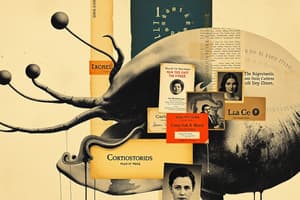Podcast
Questions and Answers
Which statement is correct regarding the use of corticosteroids in acute gout cases?
Which statement is correct regarding the use of corticosteroids in acute gout cases?
- Corticosteroids are recommended as the first-line treatment for acute gout.
- Corticosteroids should never be used in acute gout cases.
- Corticosteroids are ineffective in treating coexistent systemic illness or marked inflammation.
- Corticosteroids should be used when NSAIDs or colchicine are contraindicated or not tolerated. (correct)
In a randomized trial comparing prednisolone, indomethacin, and etodolac for acute gout, which statement is true?
In a randomized trial comparing prednisolone, indomethacin, and etodolac for acute gout, which statement is true?
- Prednisolone 30 mg daily for 5 days and standard doses of indomethacin or etodolac were equally effective. (correct)
- Prednisolone 30 mg daily for 5 days was less effective than standard doses of indomethacin or etodolac.
- Prednisolone 30 mg daily for 5 days was more effective than standard doses of indomethacin or etodolac.
- The trial did not compare the effectiveness of prednisolone, indomethacin, and etodolac.
If only one or two joints are affected in an acute gout attack, what is the recommended treatment according to the text?
If only one or two joints are affected in an acute gout attack, what is the recommended treatment according to the text?
- Inject the affected joints with a corticosteroid and a local anesthetic. (correct)
- Administer colchicine orally.
- Administer high doses of NSAIDs immediately.
- Inject the affected joints with a local anesthetic only.
What is the recommended duration of NSAID treatment for an acute gout attack if the patient is seen within the first 24 hours and has no history of NSAID intolerance?
What is the recommended duration of NSAID treatment for an acute gout attack if the patient is seen within the first 24 hours and has no history of NSAID intolerance?
If an acute gout attack responds completely to an NSAID, how should the NSAID dose be adjusted according to the text?
If an acute gout attack responds completely to an NSAID, how should the NSAID dose be adjusted according to the text?
When are NSAIDs recommended as the first-line treatment for acute gout?
When are NSAIDs recommended as the first-line treatment for acute gout?
Which of the following statements about indomethacin is correct?
Which of the following statements about indomethacin is correct?
What is the recommended strategy for preventing NSAID-related ulcers in patients at high risk?
What is the recommended strategy for preventing NSAID-related ulcers in patients at high risk?
Which of the following statements about colchicine is incorrect?
Which of the following statements about colchicine is incorrect?
Which of the following statements regarding corticosteroids in gout treatment is true?
Which of the following statements regarding corticosteroids in gout treatment is true?
Which of the following statements about combination therapy for acute gout management is incorrect?
Which of the following statements about combination therapy for acute gout management is incorrect?
Which of the following statements regarding NSAID-related toxicities is correct?
Which of the following statements regarding NSAID-related toxicities is correct?
Flashcards are hidden until you start studying




